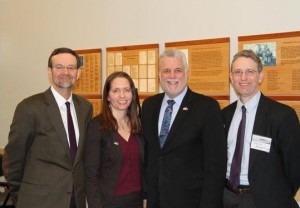Universities and colleges provide a unique opportunity to bring diverse perspectives into the public conversation.
 As the organizers of the Power from the North conference at University of Vermont this past week we were proud to do just that.
As the organizers of the Power from the North conference at University of Vermont this past week we were proud to do just that.
More than 250 participants convened for a genuine discussion illustrating distinct perspectives, some fundamental tensions, as well as some opportunities for agreement as we look to our energy future.
The conference was set against the backdrop of a very current conversation in Vermont and New England. Québec has hydro-electric resources that could help alleviate the region’s overwhelming dependence on natural (methane) gas while moving towards meeting greenhouse gas reduction goals.
But at what price would that power come? How would it get there? And if new transmission lines are required, as seems likely, where would they go, who would benefit?
What are the social, environmental and economic consequences?
Regional policy-makers, business leaders and academics gathered to debate these questions, looking at the past, present and future.
 ‘The Past’ segment grappled with the complex history that created the conditions of the present:
‘The Past’ segment grappled with the complex history that created the conditions of the present:
A former Vermont regulator explained how the administration of former Gov. Richard Snelling looked north in an effort to secure cheap, reliable power.
A Québec historian described the rise of Hydro-Québec, not merely as a public power company, but as a “social project” by and for French Canadians seeking political and economic mastery in their own house during the 1960s’ Quiet Revolution.
Innu Chief Ghislain Picard forcefully described Hydro-Québec’s failures to consult with or compensate First Nation peoples until the 1970s, the improvements since that time, and the tribes’ continuing frustrations to win a seat at the decision-making table.
Opening a discussion of ‘The Present,’ the operator of the New England grid described new transmission projects that could bring additional power from the North, and the current dominant role played by natural gas in the region’s energy mix.
A regional environmental leader reminded the audience of the enormity of impending change with climate instability, and the urgent imperative to reduce fossil-fuel reliance.
The final session moderated by Vermont Law School’s Michael Dworkin looked to the future with Green Mountain Power President and CEO, Mary Powell, showcasing innovations of electric utilities that have begun to envision a very different relationship with their customers and how they might provide energy services in the future.
The massive scale of impending change in energy systems and the imperative to counter the pervasive fossil-fuel culture was articulated by a former energy regulator in Massachusetts.
These speakers’ visions of future change, which emphasized the positive potential of distributed (decentralized) renewable generation, were juxtaposed with the perspective of the Québec Minister of Energy and Natural Resources, who described a future in which large-scale hydropower can play an increasingly critical role in meeting energy demand and “de-carbonizing” regional electric systems.
Given the complexities of the many issues associated with large-scale hydropower and the diversity of perspectives among key actors, this conference provided a valuable place for rich discussion and open and genuine discourse.
The conference did not promote a specific agenda or favor one perspective over another.
In that spirit, proceedings, video interviews and a summary report will all be made publicly available within 30 days. To be added to the mailing list for this report, email crvt@uvm.edu.


Recent Comments